Creamy Polenta
If you want to make beautifully creamy polenta on the stovetop, you're on the right page. The ingredient list is short, and the leftovers deliver meals for days.
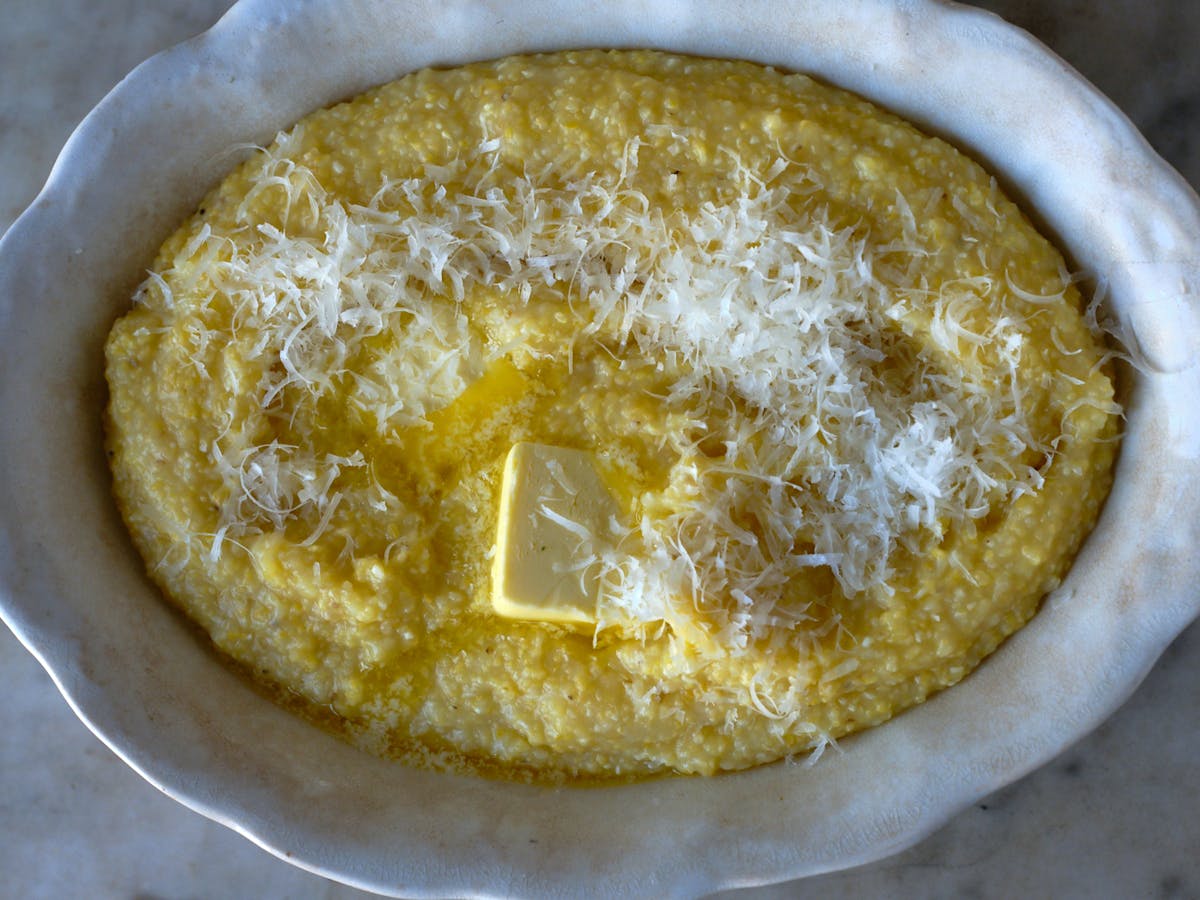
Cooking polenta in modern times doesn’t have much in common with the way it was prepared for centuries in the regions that now make up Northern Italy. Polenta was traditionally cooked on a grand scale in copper cauldrons over open fire. There was a lot of stirring, ladling, and creative, resourceful uses of leftovers. Historically it was considered one of the humblest foods and when I came across this line about polenta in Honey From a Weed by Patience Gray (1986), it stuck with me. “The idea of polenta, planted firmly in the north Italian imagination, is the antithesis of modern aspirations. It therefore intrudes on modern life like a vague emotional regret.”
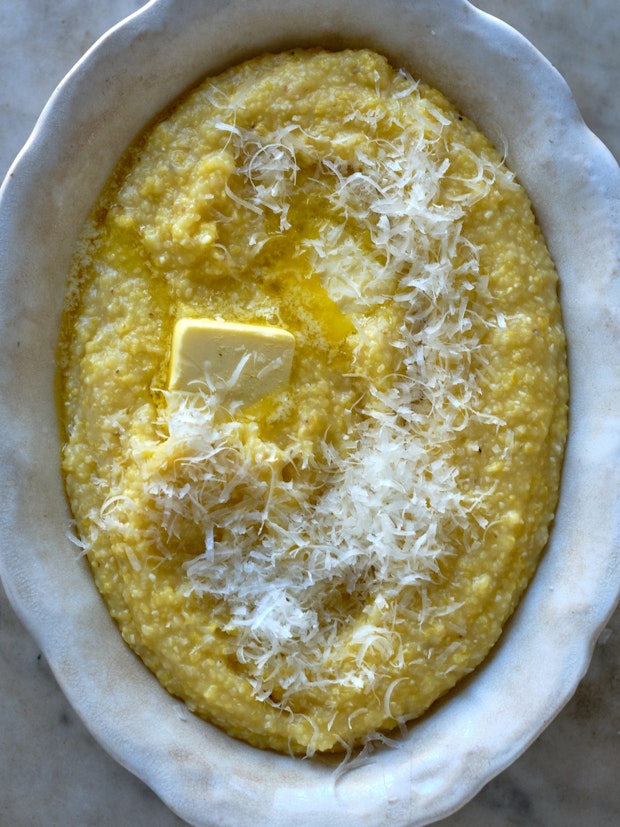
But, polenta is wonderful. And similar to other foods that were cast off in exchange for industrialized, refined counterparts - brown rice, naturally leavened breads, etc. — many people find their way back to the “old ways” eventually.
What is Polenta?
Think of polenta as a cornmeal porridge of sorts. In The Classic Italian Cook Book (1973), Marcella Hazan asserts the importance of polenta by saying, “…to call polenta a cornmeal mush is a most indelicate use of language. In country kitchens, polenta was more than food, it was a rite. It was made daily in an unlined copper kettle, the paiolo, which was always kept hanging at the ready on a hook in the center of the fireplace.” She goes on to describe a wonderful scene where, "…there was a moment of joy as it [polenta] was poured out in a steaming golden circle on the beechwood top of the madia...”
About This Polenta Recipe
Polenta is a regular preparation in my kitchen, and it can be cooked a number of ways. Not just in a cauldron lol. I jump back and forth between stovetop polenta and oven-baked polenta depending on a number of factors. Today I’m going to talk through my technique for making beautifully creamy polenta on the stovetop. We’ll get to the oven-baked version in a future post. That one is great if you just want to combine ingredients in a baking dish, push it into the oven, and forget about it until the timer goes off. But it's not as creamy. In either case, the ingredient list is short, and most of your attention should be focused on sourcing some great cornmeal / polenta. Beyond that, a bit of patience, and technique is all you need. I love it served topped generously with this mushroom ragù as you'll see down below.
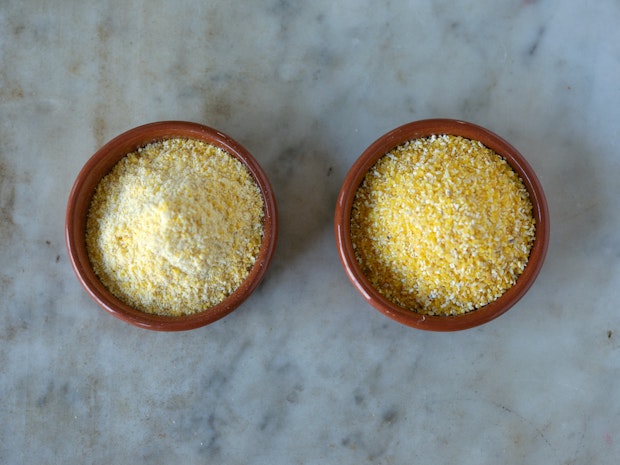
Which Polenta (a.k.a. cornmeal or grits) Should I Use?
Look for stone-ground, whole grain, whole kernel polenta without any additives - preferably organic. Store-bought, quick-cooking, refined polenta is the starchy endosperm of the corn kernel, and much of the flavor from the bran and germ is stripped out in the milling process. These are a few favorites to look for.
- Hayden Flour Mills Yellow Corn Polenta: My local market carries Hayden and this is the polenta I purchase most often. It is coarse grind, so it takes a bit longer to cook, but the flavor and texture is wonderful. (Pictured above right)
- Bob’s Red Mill Organic Medium Grind Cornmeal: Stone-ground, whole grain. Readily available and a solid choice. If I’m looking for a polenta that will cook a bit faster, this is the one to grab because the corn is medium coarse and a bit finer. (Pictured above left)
- Rancho Gordo Fine Yellow Polenta: If you like a finer grind, this is your choice. Organic, heirloom corn grown & ground by Anson Mills for RG. IYKYK.
Whole polenta is quite perishable. Use it quickly or store it in the freezer.
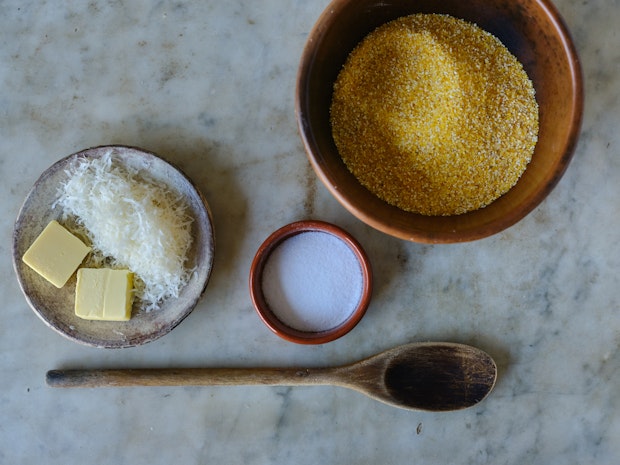
Do I Have to Stir Polenta with a Wooden Spoon?
If you read through old polenta recipes, many will mandate stirring with a wooden spoon. It’s a good suggestion, but your polenta will be just fine if you use a stainless steel spoon instead. That said, wood spoons are kinder to your pots, less likely to scratch (especially if your pots have any sort of coating). And, some metal spoons (especially very old ones) can react to acidic ingredients resulting in a metallic taste. If you’re making tomato sauce or sourdough, for example.
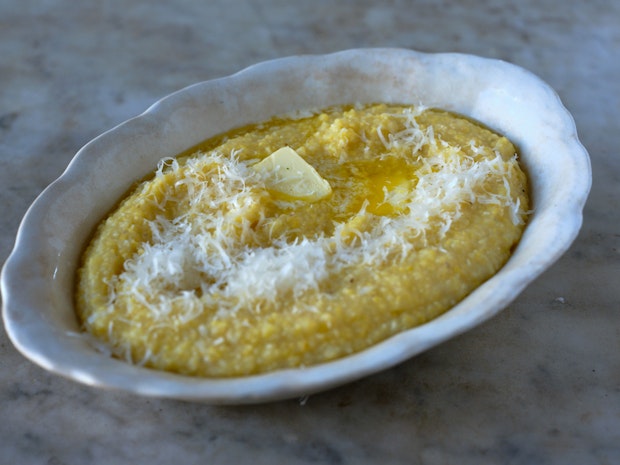
Polenta Variations
Knowing how to make a great pot of polenta sets you up with a foundation to keep it simple and straight-forward (like the creamy polenta recipe below), or to add your own twists and flavors. Here are a few ways you can switch things up.
- Use broth: Instead of water as the base liquid in your polenta experiment with broths, teas, or other infusions. I often make mine with a favorite mushroom tea (topping the polenta with these baked mushrooms.
- Make it herby: Polenta has a real affinity for certain herbs. My favorite is chives. Double down with a couple handfuls of snipped chives folded in along with some chive compound butter.
What to Do with Leftover Polenta
There are many things to do with leftover polenta. Patience Gray includes this wonderful paragraph (Honey From A Weed, 1986) that exemplifies the cycle of a pot of polenta, “…made one day to serve hot, what is left is sliced and fried in hot oil till golden (polenta fritta), or brushed with oil and grilled (polenta ai ferri), to eat the next day. If chopped salame, parmesan cheese, butter and egg yolks are added to the polenta once it is stiff, and, when it has cooled, the beaten egg whites are folded in, and the preparation put into an oiled oven dish, what emerges after 45 minutes in a hot oven is a torta di polenta.”
Here are a couple other ideas:
- Baked Polenta: Slice into strips, brush with olive oil and pan-fry or bake at 350°F into golden, tasty slabs. Serve topped with mushroom ragù.
- Polenta in Sourdough: A favorite - crumble polenta into sourdough prior to baking. I tend to do this after my second set of folds. Or, fold into quick bread batters.
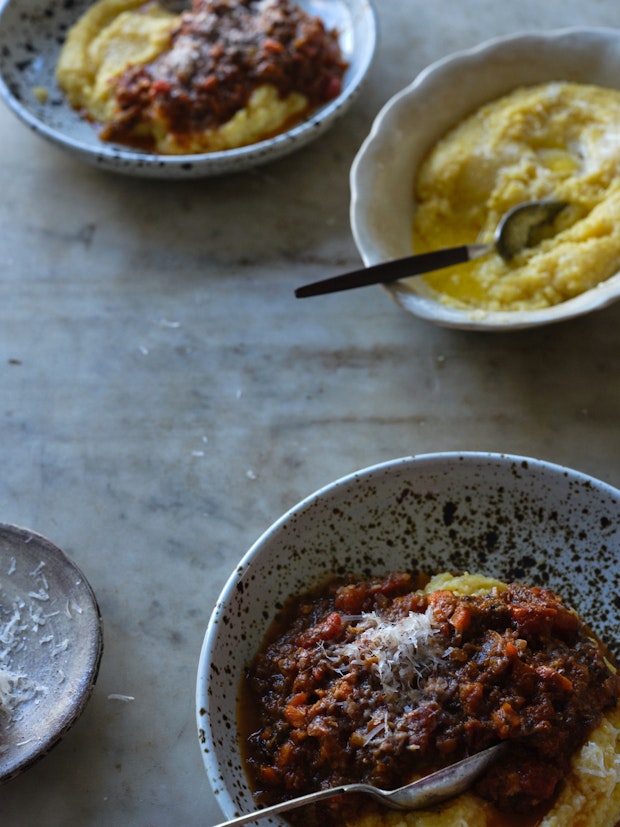
More Polenta Recipes
More Italian Recipes
Creamy Polenta
Be sure you’re not using instant or quick-cooking polenta or cornmeal here.
- 6 cups water
- 1 3/4 teaspoons fine grain sea salt
- 1 1/2 cups / 225 g polenta - coarse or medium coarse cornmeal
- 2 tablespoons butter or extra virgin olive oil
- freshly grated Parmesan cheese
-
In a medium, heavy bottomed saucepan bring the water to a boil over high heat. Add the salt and use a whisk in a clock-wise motion to swirl the water into a vortex. Slowly pour the cornmeal into the pot, maintaining a boil and continuing to stir. This is basically prevents lumps and clumping.
-
Once all the cornmeal has been added, reduce the heat to a low simmer and stir frequently until polenta gets creamy. When it begins to thicken, switch from a whisk to a spoon to stir. Continue to simmer, stirring frequently, until the polenta is thick, creamy, and really holds a streak when you pull a spoon through, 30-35 minutes or so. It should be very soft.
-
Remove from heat and serve topped with butter or olive oil and grated cheese.
Serves 4-6.


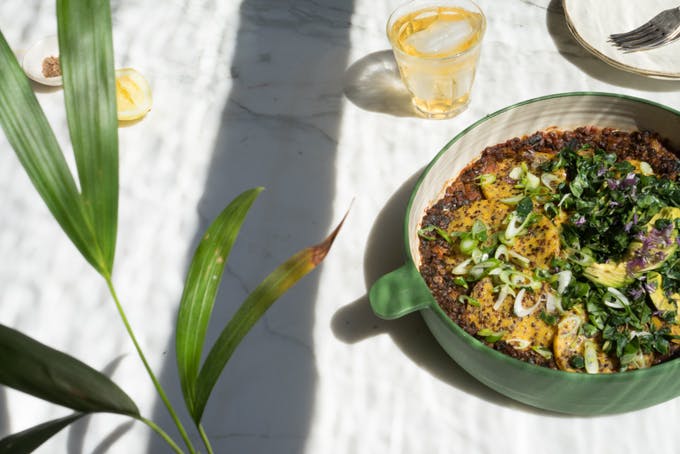
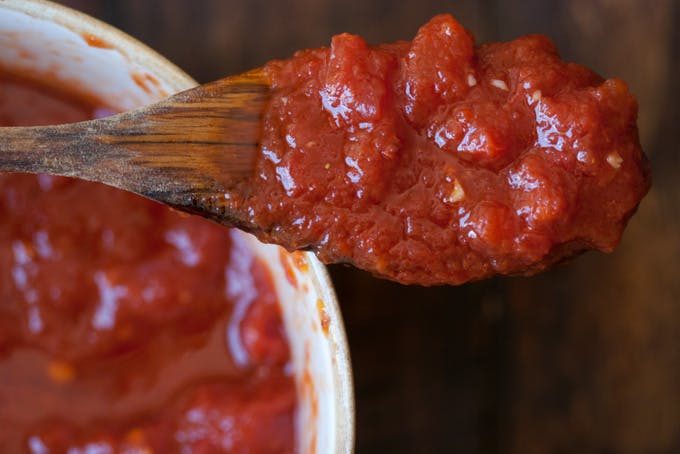
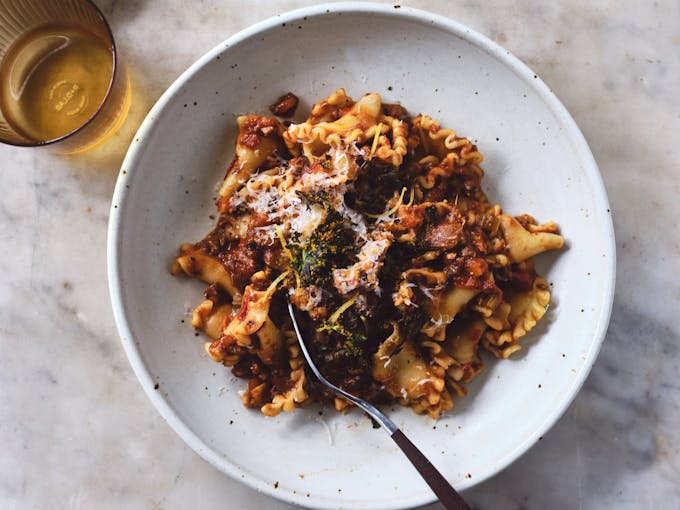
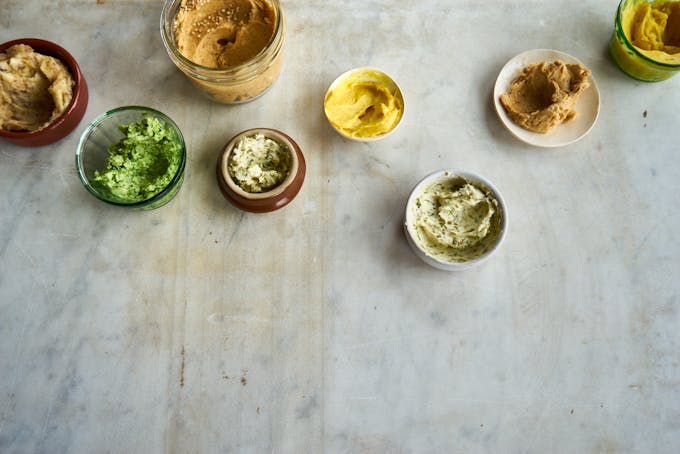
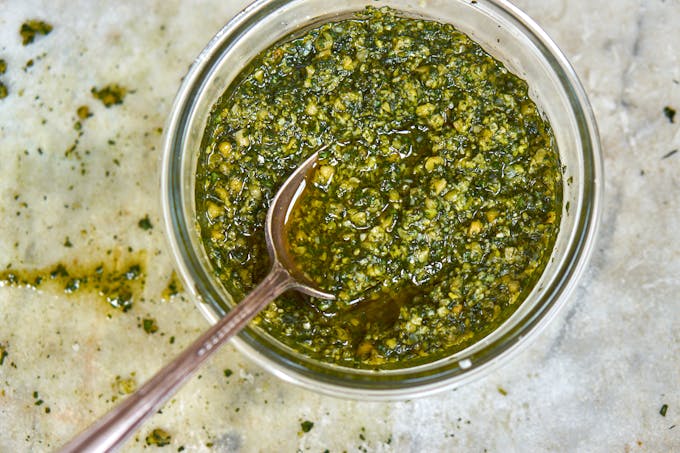

Post Your Comment